
When you think of “local PPC”, you might think of local businesses doing Google Ads — hair salons, car dealerships, accountancy practices, party services, or real estate agents.
Indeed, PPC provides a great opportunity for these types of local businesses to reach local customers… But what about larger businesses — national and international corporations? They also could benefit greatly from a local PPC strategy. Their target audiences aren’t floating in the ether. They live and work somewhere, and they have ties to a location. Yet, from what we’ve seen, a well-executed local PPC strategy is far less common with larger enterprises.
For example, in the screenshot below, we can see how a Ford Dealership in Austin, Texas, is hyper-localized with their ad copy.
(Keep in mind: we’ve made all of the images in this post clickable so that you can get a better look at everything.)

Why don’t larger enterprises with national or international reach do this? Because it requires a granular level of campaign detail. If a brand is targeting hundreds (or thousands) of locations with geo-specific ads, the account will soon become challenging to manage and hard to optimize.
However, by using iSpionage’s SEM Campaign Watch, we’ve uncovered how one major U.S. insurer is challenging more established competitors with a simple trick: using localized ad copy. While most other insurers merely flick a switch to reach their target cities and/or states, Lemonade is going further.
Lemonade: Testing and Optimizing a Localized PPC Strategy
It’s hardly a surprise that Lemonade is doing PPC differently. After creating a new business model based on behavioral economics and artificial intelligence, they’ve built their insurance service on a digital platform, using chatbots and automation. And they’ve snatched 10% market share in just 3 years.

But we’re not here to vouch for Lemonade — we’re completely unaffiliated with them, and they’re not an iSpionage customer. We simply found that they had an interesting local PPC strategy that other brands might be able to learn from. Specifically, we simply want to shine a light on:
- How their PPC strategy has more of a local twist than any of their competitors.
- How they’re reaping the benefits in some regions while still testing localization in others.
Note: Lemonade is currently active in 27 U.S. states (as of spring 2020) and in Germany, but they’re set to roll out to the rest of the U.S. and Europe in coming months.
Challenging U.S. Competitors for “Home Insurance” Keywords
Using the iSpionage monitoring tool, SEM Campaign Watch, we set up multiple projects to track the PPC keyword “home insurance” for the most populous cities in the U.S. This local monitoring highlighted a clear pattern; Lemonade competes at the top of the paid SERPs for 22 of the 30 cities we researched.
Lemonade’s PPC strategy shows the same general method across the U.S.:
For search terms with local geo-specific words (e.g. “home insurance Houston”), Lemonade serves ads with headlines that mention the city. For keywords searched by users in the city, but without local qualifiers, (e.g. “home insurance”), they serve ads with headlines that mention the state, (e.g. Texas).
In the first screenshot below, we show the section of SEM Campaign Watch that tracks live ads and A/B testing. Here, we notice that for “home insurance Houston”, Lemonade is running this localized ad:

And below, in the User Journey view of SEM Campaign Watch, we can see that the “home insurance” keyword in Houston has triggered a variety of state-level localized ads:
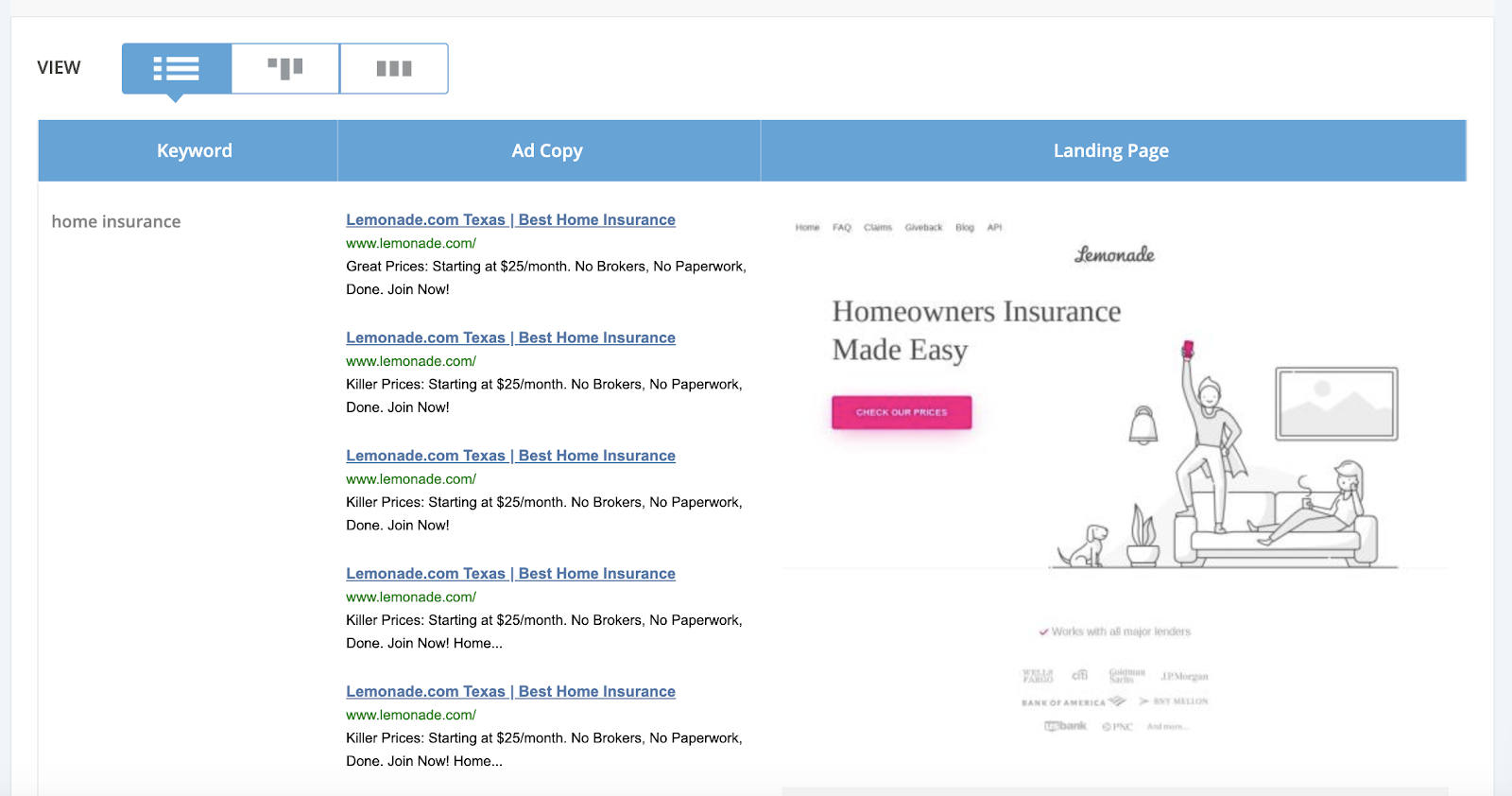
So, on the surface it looks like this is the extent of Lemonade’s local PPC strategy: if the search term itself includes the city, personalize the ad to mention the city. If it doesn’t, just mention the state in the ad. This may suggest a state-wide ad campaign structure for non-geographic keywords.
And that would make sense. You can imagine that trying to manage city-specific ads for every single search term (even those that don’t mention a city) would be onerous — so limiting it to state level ad copy on search terms with no city or state might be enough “localization” for Lemonade.
However, this doesn’t seem to be the case. Lemonade does appear to be testing different ads for each major city, even on non-location-specific search terms (e.g. “home insurance”). Again, we can use our SEM Campaign Watch monitoring tool to see A/B test variations on a city-specific basis to figure this out:
Dallas:
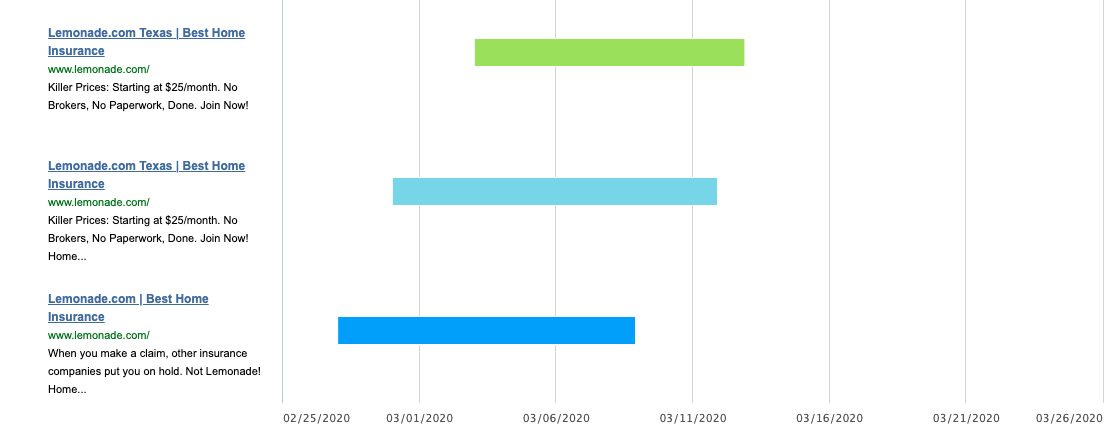
You see that in Dallas, they’re testing 3 different ad copy variants between 2/27 and 3/13. Each bar in the graph shows the dates and length of time that that specific ad variation was running.
Houston:
Now, in Houston, our tool shows 5 different ad copy variations being tested:
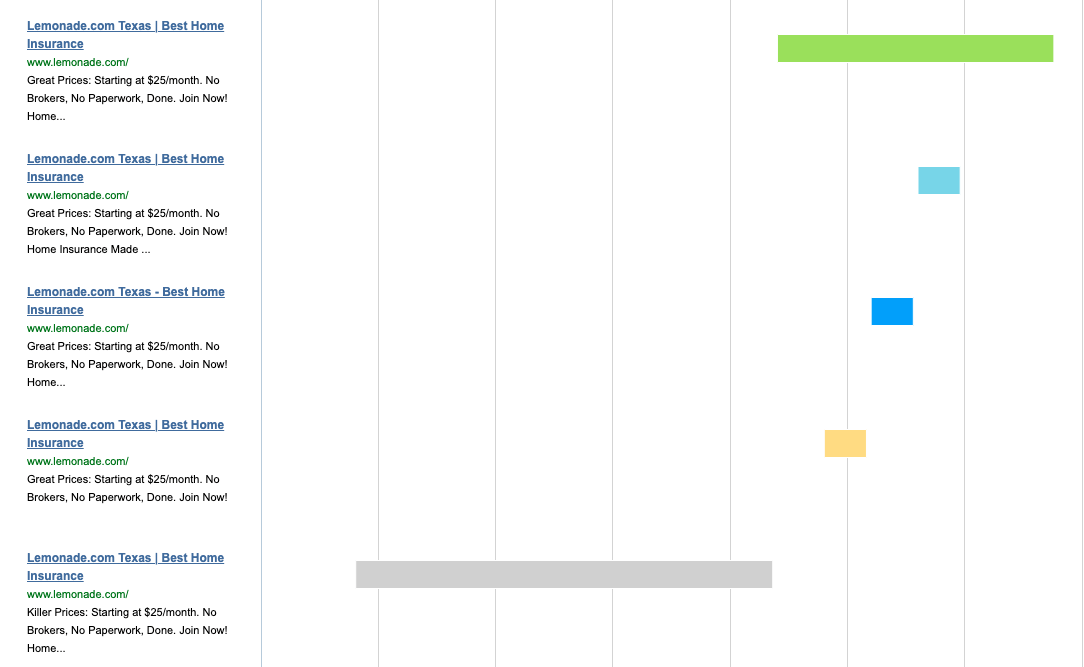
These different testing patterns within the state of Texas suggest that Lemonade is actually getting granular to figure out the optimal PPC strategy for each city. They’re not just setting up a state-wide campaign, but instead they’ve deliberately made the ad headline state-specific for each city in Texas.
We can use SEM Campaign Watch to dig into the localization strategy a bit further:
When analyzing the PPC landscape for “home insurance” across the five biggest cities in Texas — Houston, San Antonio, Austin, Fort Worth, and Dallas — Lemonade has a 99.4% average impression share and an average ad position of 3.79. This makes them one of the top performing advertisers, alongside Esurance with a 90.6% impression share, Liberty Mutual with 89.7%, and Farmers with 69.7%.
In each of these cities, Lemonade has chosen to test the word “Texas” in the ad headline. At the same time, they’re trying out different variations of ad descriptions (e.g. “great prices” vs “killer prices”) under those localized headlines. So, this suggests that they’re satisfied with the localized state-specific headline (Texas) as a constant factor, so now they’re moving on to test different variables within the ad copy.
But from our research, we can see that Lemonade is still trying out these local state-level headlines in other U.S. regions. In other words, the PPC strategy in Texas has been definitively optimized for local keywords, but they’re still A/B testing generic headlines vs localized headlines elsewhere.
In the screenshot below, you can see this being tested in Connecticut:
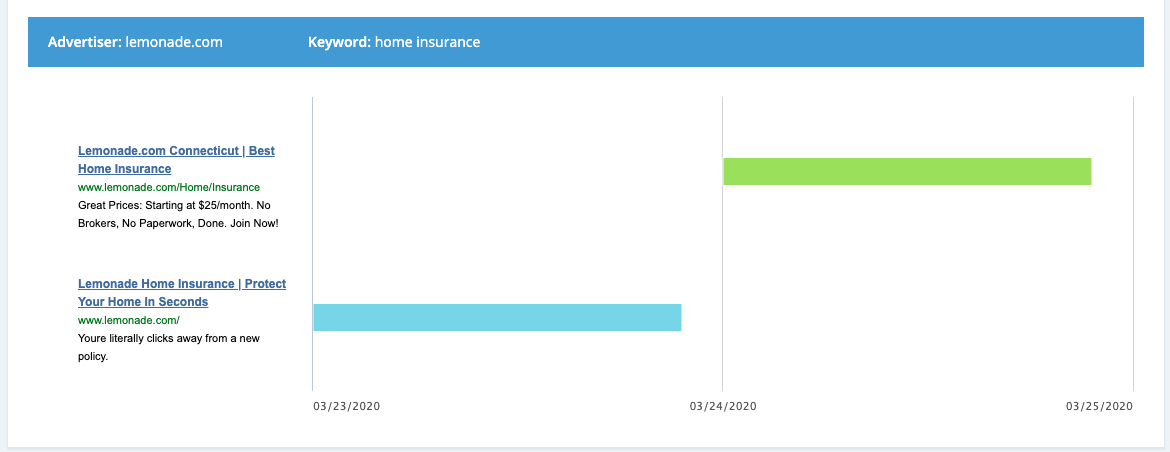
The keyword, again, is just “home insurance”. You see from the graph that they tested 2 ads recently: one with “Connecticut” in the headline, and the other without.
And here is another example from Philadelphia, where again the “home insurance” search triggers one ad with “Pennsylvania” in the headline and one without:
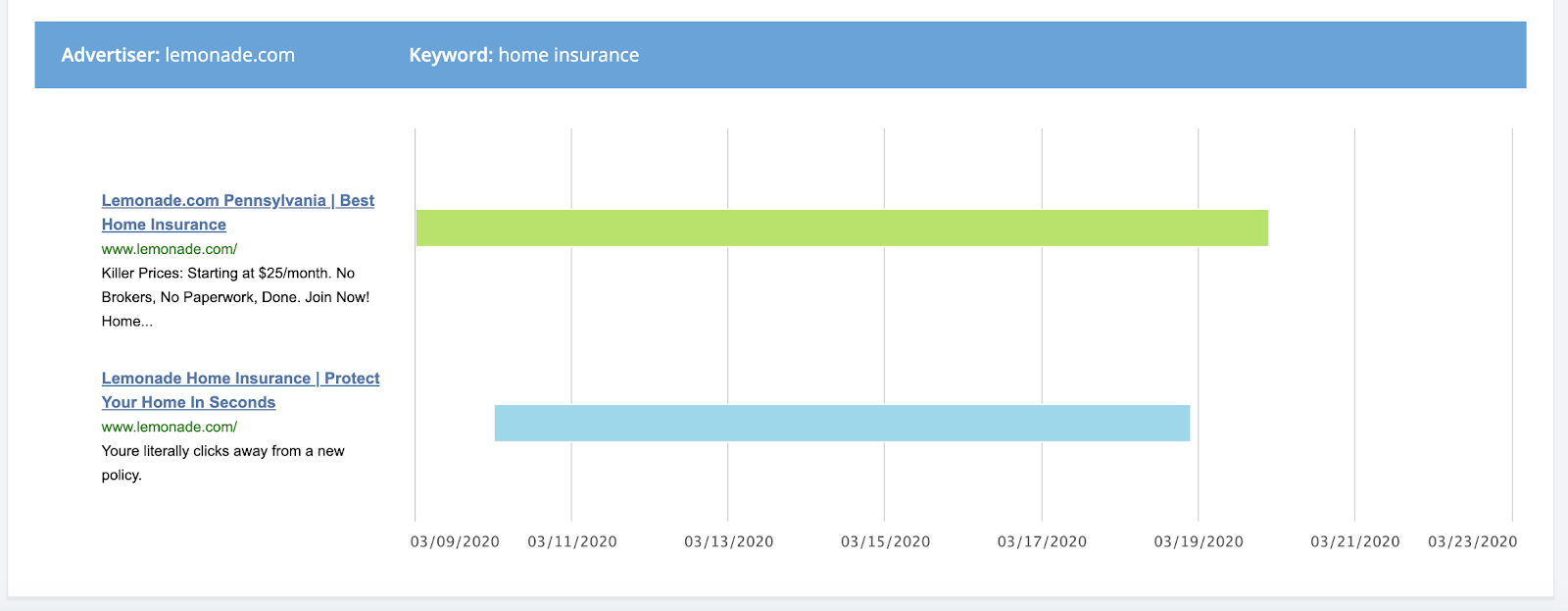
To summarize: from this research into Lemonade’s PPC strategy, we understand that they have a hypothesis that the state-specific localization of ad headlines will drive more clicks, but this hypothesis hasn’t been proven in all of their target markets.
Note: iSpionage is one of the only PPC tools on the market to offer local PPC campaign monitoring. You can do this on our SEM Campaign Watch feature, which is available via paid subscription. With our 30-day money-back guarantee, you can try it without risk.
PPC Strategy for Geo-Specific Localized Search Terms
When a search term has a geo-specific keyword in it, the picture is clearer. Lemonade tends to use localized ad copy for most major cities within their reach. We can see this when using SEM Campaign Watch to analyze the geo-specific terms searched locally. For example, Chicago:

And Boston:

And when we run a quick Competitor Research report, which gives a snapshot of the national PPC landscape for any URL or keyword, we can browse through Lemonade.com’s PPC keywords and see that they’re also targeting renters insurance, homeowners insurance, house insurance, and tenants insurance. Most of these keywords also have local variations, which are targeted with local ad headlines:

Note: Our Competitor Research functionality is available on a free iSpionage account. Receive 10 free competitor reports and 3 complimentary competitor alerts per day.
In the screenshot below, you’ll see the KEI (Keyword Effectiveness Index) column. This score indicates the likelihood that a keyword is profitable for the advertiser, based on the duration that they’ve been targeting it, and its “last seen” date. The conclusion is that if a PPC keyword has been consistently targeted over time, it must represent good ROI (learn more about KEI here).
We can see that many of the geo-specific keywords Lemonade target have a very high KEI score:
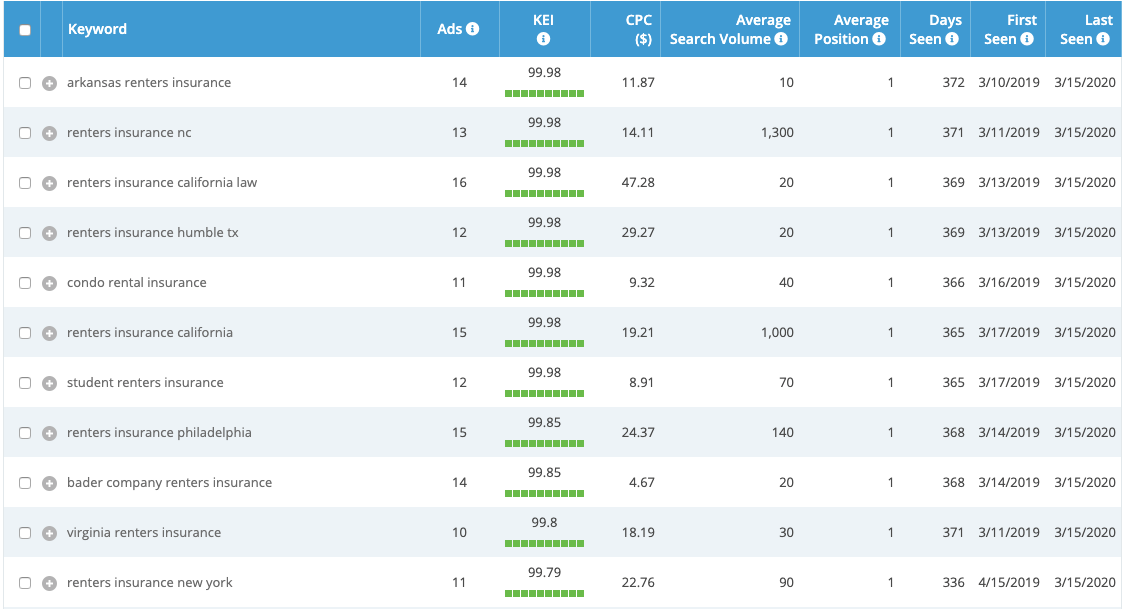
If you’re a competing insurance provider, this report suggests that many of the localized keywords are equally important as the non-local ones — because Lemonade is consistently spending budget on them. And if you’re in a different niche altogether, you might reach the same conclusion about your keywords.
Important note: The data that feeds the Competitor Research tool is national, not local. What you see in the screenshot above are localized keywords being advertised nationally. So, this gives you a rough idea for which keywords are effective for your competitors, and you can follow this up with in-depth local monitoring using the SEM Campaign Watch feature (available via paid subscription).
If we analyze insurance industry competitors, we see that Lemonade’s level of PPC localization is exceptional. Progressive doesn’t localize whatsoever, and neither does Geico — even for geo-specific searches. Liberty Mutual A/B tests a lot of ad copy (see below), but localization isn’t one of the variables. Hippo is the only direct competitor to have tested limited localization, but this stopped in early 2020.
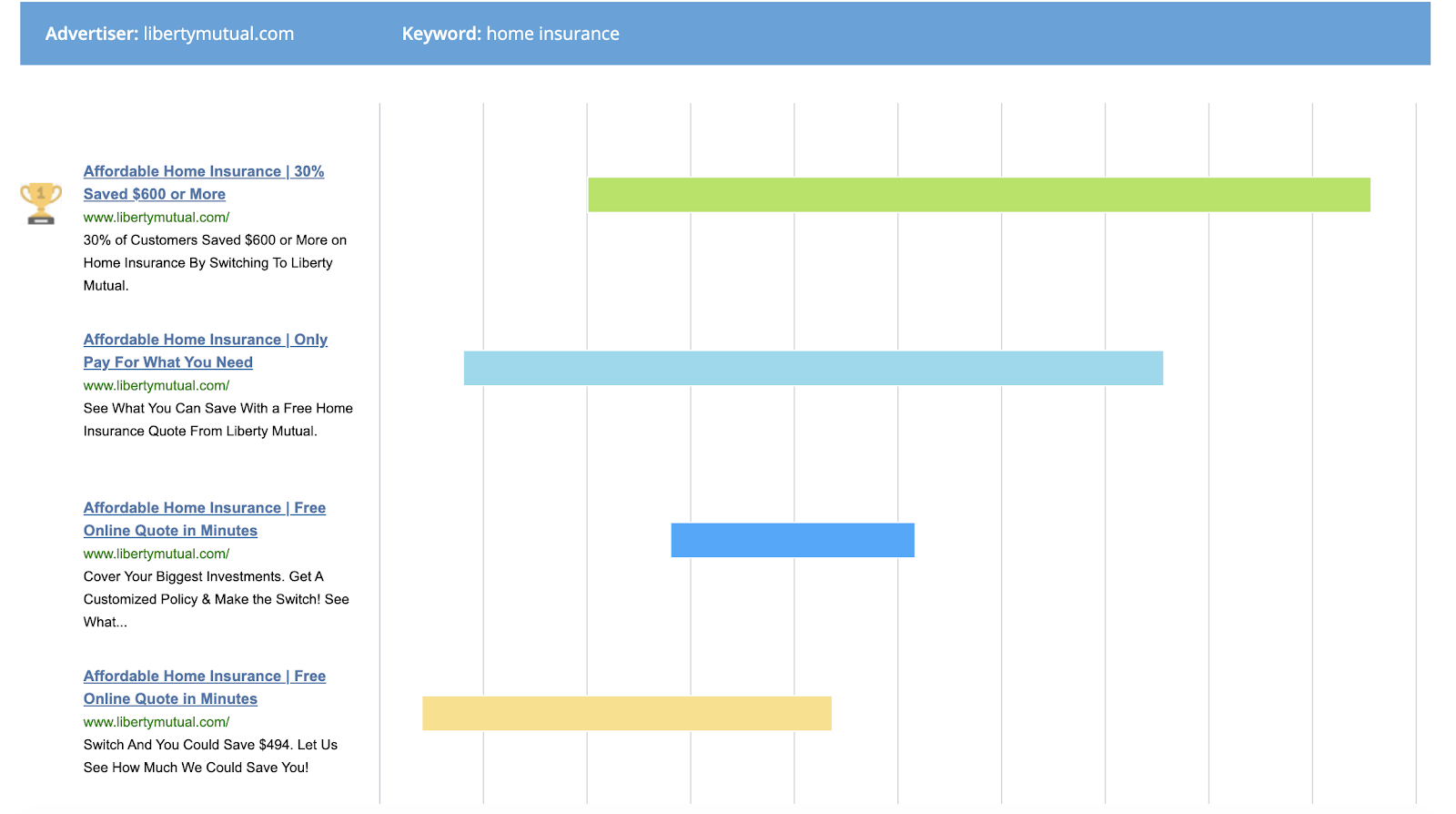
Liberty Mutual’s Google Ad A/B tests in the area of Houston, Texas.
Key Takeaways
To summarize:
Using iSpionage, we were able to see that Lemonade is one of the only nationwide insurance providers that uses a genuinely local PPC strategy. Specifically:
- For city-specific search terms, their ads tend to use city-specific copy — but they also test state-level ad copy and generic ad copy.
- For non-city-specific terms searched locally, they still use geo-personalized ad copy, but it’s simply personalized at the state level, not the city level.
- They’re A/B testing different ad copy at the city level even for non-local search terms. That is, they may be testing one set of ad copy in Dallas, and a different set of variations in Houston.
This means that Lemonade is more likely to find lower Cost-per-clicks (CPCs) and higher Return on Ad Spend (ROAS) than competitors who test generic non-geo-specific ad copy for the same keywords. If you’re a competitor, this data tells you it’s probably a good idea to start testing geo-specific ad copy.
Additionally, we learned through the high Keyword Effectiveness Index (KEI) scores that Lemonade’s Google Ads for geo-specific search terms (e.g. “home insurance Houston”) seem to be effective and profitable. So, again, if you’re a competitor, it makes sense to pay close attention — and dig further into these localized keywords in the corresponding local areas using SEM Campaign Watch.
The key takeaway from this PPC strategy teardown is that Lemonade’s local PPC rollout is methodical and evidence-based. In Texas, localized ad copy has won the A/B testing battle. This frees up Lemonade to test other variables, while keeping state-level ad headlines in place. In other cities and states, Lemonade is still testing local vs generic ad copy, and measuring the results over time.
With iSpionage SEM Campaign Watch, you can monitor localized A/B tests over time. You can sign up for a free iSpionage account to access our Competitor Research tool, and SEM Campaign Watch is available via paid subscription. With our 30-day money-back guarantee, you can try it without risk.











Comments are closed.